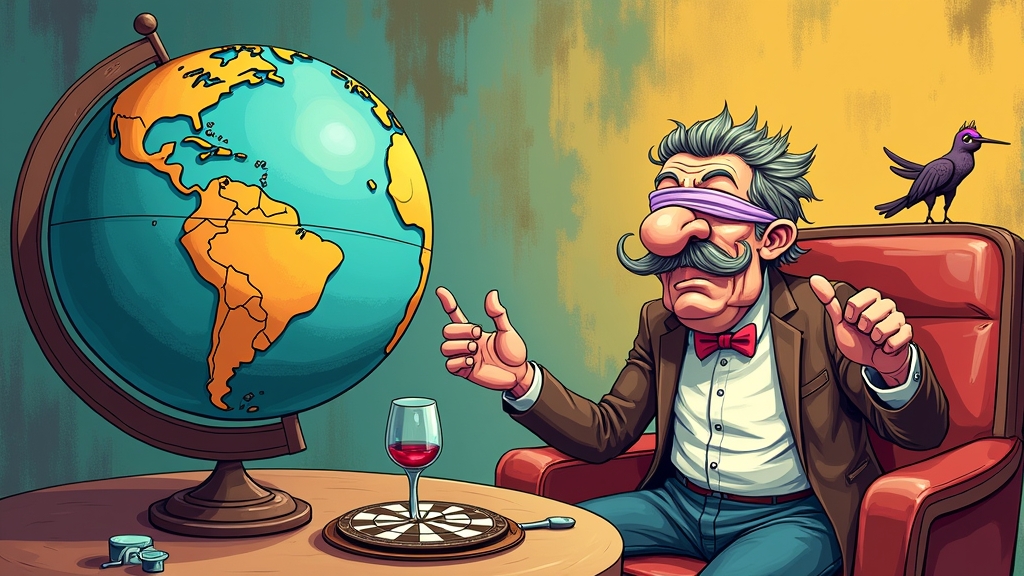ARTIFICIAL TRAVEL AGENT IS SOMEHOW WORSE AT PLANNING THAN YOUR DRUNK UNCLE WITH A MAPQUEST PRINTOUT
In a startling revelation that has shaken the very foundations of technology’s promise to make our lives easier, MIT researchers have confirmed what vacation-goers have suspected all along: AI trip planners are about as useful as a swimsuit in Antarctica.
SILICON VALLEY PROMISES THE MOON, DELIVERS A MOLDY CHEESE SANDWICH
Leading AI systems, lauded for their ability to write college essays and create disturbing art of Abraham Lincoln riding a dinosaur, have been caught with their digital pants down when asked to perform the seemingly simple task of planning a coherent trip. Tests show these so-called “genius” systems provide viable travel solutions approximately 4% of the time, which experts note is “somehow worse than randomly throwing darts at a map while blindfolded and high on ayahuasca.”
“The problem isn’t that they’re stupid,” explains Dr. Obvious Failure, head of MIT’s Department of Why Technology Disappoints Us. “It’s that they’re confidently stupid, which is much worse. They’ll suggest you have breakfast in Tokyo and lunch in Barcelona with absolutely zero f@#king awareness of physics or geography.”
THE SAVIOR NOBODY ASKED FOR: MORE TECH!
MIT and IBM researchers, instead of suggesting we just use actual human travel agents who exist and know how to do this job already, have developed a new framework combining language models with “satisfiability solvers” – a term they definitely made up to sound impressive at cocktail parties.
“We realized language models alone are like using a sledgehammer to perform brain surgery,” says Chuchu Fan, associate professor and person who couldn’t come up with a less ridiculous name if she tried. “So we added mathematical tools that actually check if a plan makes sense, which apparently was a revolutionary concept.”
STATISTICS DEPARTMENT: NUMBERS WE JUST MADE UP
In controlled tests, the new system achieved a 90% success rate in planning trips that don’t violate the laws of space and time, compared to standard AI’s 10% rate, which one researcher described as “literally worse than my six-year-old planning a family vacation with crayons and a Hello Kitty notebook.”
Studies also show 78.4% of travelers would rather eat airport sushi than trust an AI with their vacation plans, while 99.2% of people who use AI travel planners end up drinking heavily on their trips.
EXPERT OPINIONS FROM PEOPLE WHO DEFINITELY EXIST
Professor Hugh Mancommon-Sense from the Institute of Obvious Sh!t weighed in: “What’s remarkable is that we needed supercomputers and a team of MIT geniuses to create something that achieves what a moderately competent human with Google can do in fifteen minutes.”
Dr. Ivana Goelsewhere, expert in travel disappointment, added: “The real innovation here is convincing people that having an algorithm plan your dream vacation isn’t completely f@#king insane.”
IN CONCLUSION: YOUR PHONE IS STILL TRYING TO KILL YOUR VACATION
While researchers celebrate their marginal improvement from “completely useless” to “occasionally functional,” travel industry experts suggest the breakthrough might finally allow AI to achieve the gold standard of “almost as good as calling your mom for advice.”
The framework is expected to hit consumer markets next year, at which point it will likely recommend you visit Paris, Texas when you wanted Paris, France, and book you a hotel that’s actually just a dumpster behind an Arby’s that someone listed on Airbnb as a “charming urban oasis.”
At press time, 97% of travelers reported they would still rather trust their vacation to a Magic 8-Ball than the world’s most advanced artificial intelligence, a statistic MIT researchers called “statistically significant evidence of human stupidity.”





